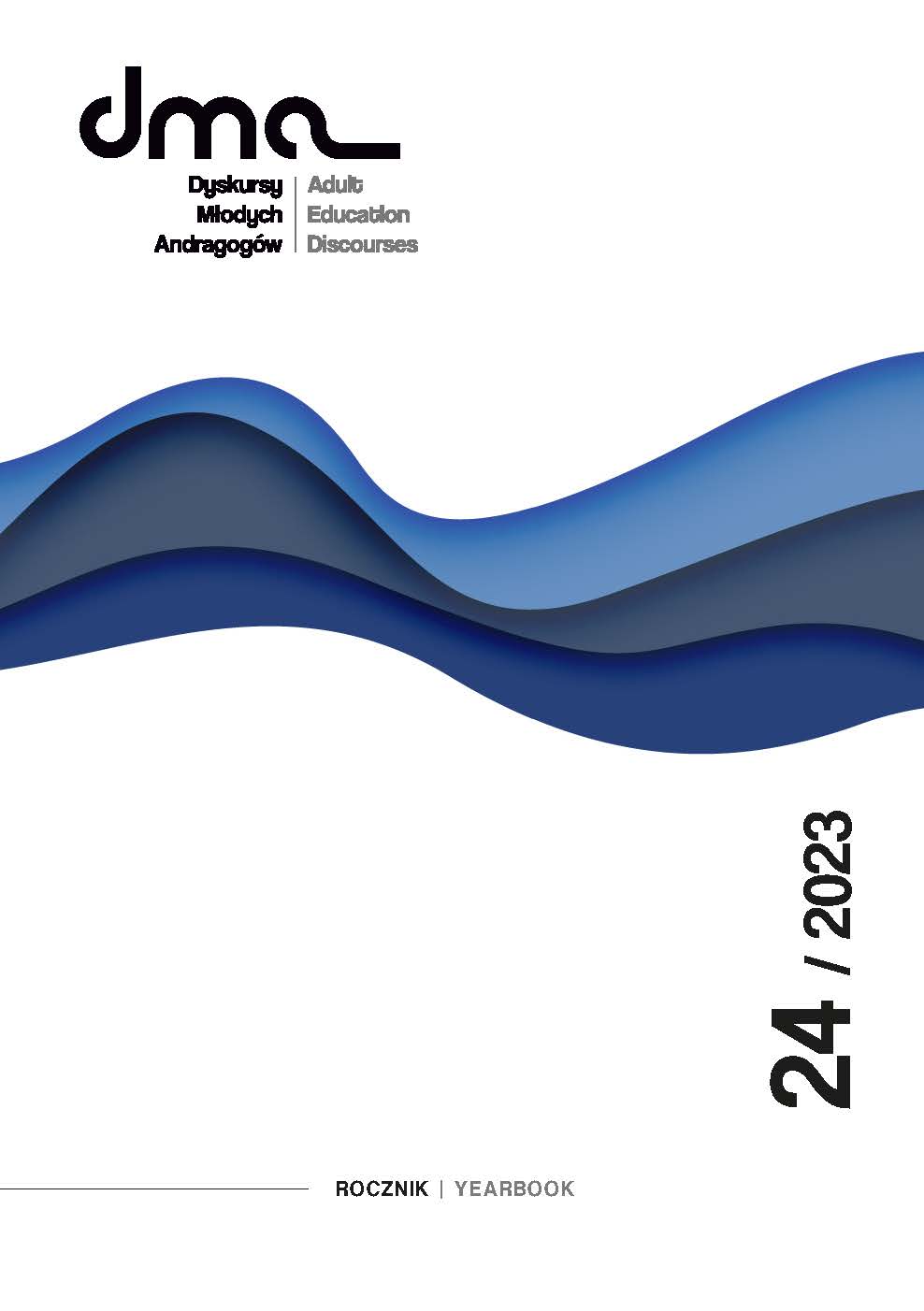Abstrakt
This essay is based on autoethnography and reflects on experience, meaningful moments, positive turning points in the author’s learning journey as a scholar, university teacher and adult educator. Becoming and being somebody has been a long, lifelong, and emotional process. The author asked this question: what does the learning journey mean and why is it meaningful for her? The essay shows how the author reflected on the experience, and used a personal diary, memos, and notes. For the reflective writing, the author based themself here on a narrative and autoethnographic approach, having in mind concentrating more on peak, positive and meaningful rather than negative experience. The final writing process was a kind of retelling that involves re-reading the diary and rewriting this essay in the form of a personal narrative. To make the essay coherent the author relied upon the structure of the narrative.
Bibliografia
Adams, T. & Herrmann, A. (2020) Expanding our autoethnographic future. Journal of Autoethnography, 1, 1-8.
Alheit, P. (2016) The biographical perspective: a new approach to lifelong learning. In: L. Jõgi & K. Krabi (eds.) Raamat õppimisest. Tallinn: Tallinn Ülikooli Andragoogika osakonna, 48-66.
Allen, D.C. (2015) Learning autoethnography: A review of Autoethnography: Understanding qualitative research. The Qualitative Report [online], 20(2), 33-35. Available at: http://www.nova.edu/ssss/QR/QR20/2/allen1.pdf. [12.12.2022].
Andersson, L. (2006) Analytic Autoethnography. Journal of Contemporary Ethnography [online], 35(4), 373-395. Available at: https://doi.org/10.1177/0891241605280.
Bruner, J. (2001) Making stories. Acts of meaning. Harvard: Harvard University Press.
Clark, M.C. & Dirkx, J.M. (2000) Moving beyond a unitary self: A reflective dialogue. In: A.L. Wilson & E.R. Hayes (eds.) Handbook of adult and continuing education. San Francisco: Jossey-Bass, 101-116.
Cormack, D., O’Neill, J., Ryan, M. & Walsh, T. (2020) Autoethnography In, And As, Adult
Education.In: B. Grummel & F. Finnegan (eds.) Doing Critical and Creative Research in Adult Education Case Studies in Methodology and Theory [online] . Leiden/Boston: Brill Sense, 73-89. Available at: https://doi.org/10.1163/9789004420755_007.
Cortazzi, M. & Jin, L. (2009) Asking questions, sharing stories and identity construction: sociocultural issues in narrative research. In: S. Trahar (ed.) Narrative Research on Learning: comparative and international perspectives. Oxford: Symposium Book, 27-46.
Davies, B. & Harré, R. (1990) Positioning: The discursive production of selves. Journal for the Theory of Social Behaviour, 20, 43-63.
Davies, B. & Harré, R. (1999) Positioning and personhood. In: R. Harré & L. van Lagenhove (eds.) Positioning theory: Moral contexts of intentional action. Malden (MA): Blackwell, 32-52.
Edwards, J. (2021) Ethical Autoethnography: Is it Possible? International Journal of Qualitative Methods [online], 20. Available at: https://doi.org/10.1177/1609406921995306.
Formenti, L. & West, L. (2016) Before, Beside and After (Beyond) the Biographical Narrative. In: R. Evans (ed.) Before, Beside and After (Beyond) the Biographical Narrative.Duisburg: Nisaba Verlag, 15-18.
Green, J., Brock, C., Baker, D. & Harris, P. (2020) Positioning Theory: Its Origins, Definition, and Directions in Education. In: N. Suad Nasir, D. Lee, R. Pea & M. McKinney de Royston (eds.) Handbook of Cultural Foundations of Education. London: Routledge, 119-140.
Halkola, U., Mannermaa, L, Koffert, T. & Koulu, L. (2009) Valokuvan terapeuttinen voima. Helsinki: DUODECIM.
Horsdal, M. (2009) The Wonders of Narrative. Language in Life, and a Life in Language: Jacob Mey – A Festschrift. Studies in Pragmatics, 6, 183-187.
Jarvis, P. (2007) Towards a philosophy of human learning: an existentialist perspective. In: P. Jarvis & S. Parker (eds.) Human Learning. An holistic approach. London/New York: Routledge, 1-16.
Kareva, D. (2011) Jutuvestmise tervendav kunst. Sirp [online]. Available at: https://dea.digar.ee/article/sirp/2011/10/28/7.3. [12.12.2022].
Lauristin, M., Vihalemm, P., Kalmus, V., Keller, M., Kiisel, M., Masso, A., Opermann, S., Seppel, K. & Vihalemm, T. (2017) MeeMa 2014 lähtekohad ja ühiskondlik kontekst.In: P. Vihalemm, M. Lauristin, V. Kalmus & T. Vihalemm (eds.) Eesti ühiskond kiirenevas ajas. Uuringu „Mina. Maailm. Meedia“ 20022014 tulemused.Tartu: Tartu Ülikooli Kirjastus, 1-109.
Leito, T. (2009) Olemise olekud. Mõttekatked ja tundepildid.Tallinn: Eesti Loodusfoto.
Linnap, P. (2008) Fotoloogia.Tallinn: Jutulind.
Lonka, K. (2018) Phenomenal Learning from Finland.Helsingi: Edita.
Maison, D., Jaworska, D., Adamczyk, D. & Affeltowicz, D. (2021) The challenges arising from the COVID-19 pandemic and the way people deal with them. A qualitative longitudinal study. PLoS ONE [online],16(10). Available at: https://doi.org/10.1371/journal.pone.0258133.
Mälkki, K. (2010) Building on Mezirow’s Theory of Transformative learning. Theorizing the challenges to reflection. Journal of Transformative Education,8(1), 42-46.
McAdams, D.P. (1985) Power, intimacy, and the life story. Personological inquiries into identity.New York: Guilford Press.
Moxey, K. (2009) Visuaaluuringud ja ikooniline pööre. Kunstiteaduslikke uurimusi. Kd18/1-2. Tallinn: Eesti Kunstiteadlaste Ühing.
Ogueji, I.A., Okoloba, M. & Demoko Ceccaldi, B.M. (2022) Copingstrategies of individuals in the United Kingdom during the COVID-19 pandemic. Current Psychology [online], 41, 7493-7499. Available at: https://doi.org/10.1007/s12144-020-01318-7.
Pastuhov, A. & Sivenius, A. (2020) Doing ethnographic research in adult education. In: B. Grummel & F. Finnegan (eds.) Doing Critical and Creative Research in Adult Education Case Studies in Methodology and Theory [online]. Leiden/Boston: Brill Sense, 63-72. Available at: htpps://doi.org/10.1163/9789004420755_006.
Paul, T. (2002) Põuapäikese paistel.Tallinn: Kunst.
Phillips, D.C. & Soltis, J.F. (2004) Perspectives on learning. New York/London: ColumbiaUniversity.
Raggat, P. (2006) Multiplicity and conflict in the dialogicalself: a life-narrative approach. In: D. McAdams, R. Josselson & A. Lieblich (eds.) Identity and Story. Creating Self in Narrative. Washington DC: American Psychological Association, 15-36.
Saldana, J. (2015) The Coding Manual for Qualitative Researchers.London: Sage.
Sparkes, A. (2020) Autoethnography: Accept, revise, reject? Reflections of an evaluative self. Qualitative Research in Sport, Exercise and Health [online], 12(2), 289-302. Available at: https://doi.org/10.1080/2159676X.2020.1732453.
Ulzheimer, L., Kanzinger, A., Ziegler, A., Martin, B., Zender, J., Römhild, A. & Leyhe, C. (2021) Barriers in Times of Digital Teaching and Learning – a German Case Study: Challenges and Recommendations for Action. Journal of Interactive Media in Education [online], 1(13), 1-14. Available at: https://doi.org/10.5334/jime.638.
Väljataga, M. (2008) Narratiiv. Keel ja Kirjandus, 8-9, 684-694.
Veidemann, R. (1999) Postmodernistlik identiteet. Sirp [online]. Available at: https://www.sirp.ee/archive/1999/16.07.99 /Sots/sots1-3.html [12.12.2022].
Weiser, J. (1999) Photo therapy techniques. Exploring the secrets of personal snapshots and family albums. San-Francisco: Jossey-Bass Publishers.

Utwór dostępny jest na licencji Creative Commons Uznanie autorstwa 4.0 Międzynarodowe.
Copyright (c) 2023 Dyskursy Młodych Andragogów/Adult Education Discourses

 /
/  Język
Język

